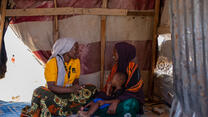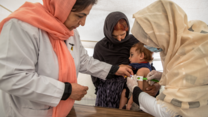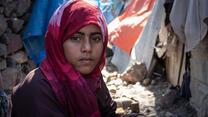Family planning is one of the most life-saving and empowering interventions in health. Yet misguided assumptions are restricting it from the women and girls who need it most.
225 million women and girls around the world have an unmet need for family planning. They include those who want to delay pregnancy and those that don’t want more children. Millions of these women and girls are also experiencing humanitarian crises, at a global scale unseen since World War II.
Despite an overwhelming need, family planning remains one of the biggest gaps in humanitarian response. A miniscule portion of women’s health funding has gone to conflict-affected countries, despite the fact that they have worse reproductive health indicators than stable countries with similar incomes. Areas affected by crisis remain responsible for 60 percent of all preventable maternal deaths.
Many of the barriers to family planning in these contexts are well-known: expenses, biases of well-intentioned providers, lack of supplies and shortages of trained health care workers. But we must recognize that unsupportive, misinformed people and systems are also standing in the way — both near and far.
For years, key actors of the aid community have used myths to steer funding and political support away from family planning for those who need it most.
These assumptions include that:
- Family planning is neither desired nor possible in certain cultural, religious or humanitarian contexts.
- Short-acting contraception satisfies the demand of women and girls.
- Women in emergencies do not want family planning.
- Family planning is too difficult to provide in humanitarian settings.
These notions are both false and harmful. The International Rescue Committee (IRC) knows that donors, governments and aid agencies are neglecting what women want, what is possible, and our responsibility to save lives. We must shift the conversation from myths to realities.
First, the global community cannot claim to prioritize the lives of women and children in crises while neglecting family planning. Family planning is the most proven and cost-effective way to reduce maternal death and disabilities, and need for abortion. Unsafe abortions are responsible for 13 percent of maternal mortality, which is likely even higher in refugee settings. With a historic number of women and girls affected by crisis, we must reassess our priorities now.
Second, there is no place that we know of — regardless of cultural, religious or humanitarian context — where family planning isn’t possible or desired. The reality is that women of all faiths use family planning, and many with the support of their religious leaders. For example, the IRC is working with Catholic communities in the Democratic Republic of Congo that are supporting family planning, as well as religious leaders in Pakistan who embrace contraception based on, not despite, their Islamic beliefs.
Above all, whether women are fleeing from crisis or supporting the recovery of their communities, they have shown that they want family planning.
It is time to start listening.
The IRC recommends:
- Family planning must be recognized as a right of all women and girls, regardless of where they live, or their displaced status. Regardless of context, donors and agencies should seize opportunities to provide family planning throughout a woman’s life cycle and for vulnerable populations. This includes testing new and promising service delivery models and scaling up high-impact interventions.
- Family planning, including long-acting and permanent methods, must be a priority in responding to acute emergencies. Humanitarian interventions must incorporate comprehensive family planning at the beginning of every health response. This can be significantly improved by codifying family planning as a primary component of the international standards for reproductive health in humanitarian response. Donors must address the lack of funding for comprehensive family planning in crisis settings.
- All health care interventions should include family planning. Whether donors and aid organizations are supporting crisis or recovery, primary care interventions should incorporate family planning. Family planning should be available to all women and girls, regardless of where they fall along the relief-to-development continuum.



